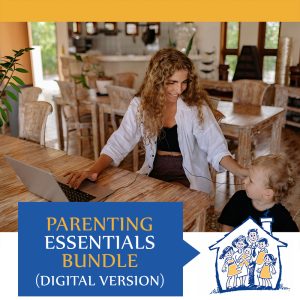When do you talk about “it”?
I have to ask it because it’s something I struggle with talking about to my kids . . . when do you talk to your children about sex? How do you go about it so that they understand that sex is actually a good thing at the right time and place, and not some evil thing (the world’s view) that you have to do to bring children to the world? Or worse yet, that it is some sneaky thing that adults don’t want you to know about or do but that if you don’t do you are deprived or weird, or something.
Many of the young women I work seem to have a warped view of sex and I don’t want my children to have the same view. However, it’s so tempting to just try and prolong their innocence for as long as possible and to not bring sex and all of the worldly issues into our conversations. . .
As soon as possible!
When my daughter was 6, her best friend was over playing one day, and that day changed everything for us.
From the time my children could understand language I taught them that there bodies were “special”. I taught them that they shouldn’t ever show anyone their special bodies unless Mommy was with them. I also taught them about appropriate kinds of touch. This may seem like I was starting a little young, but we lived with foster children, most of whom had some sexual background. In order to protect my children, I started talking about things really early. Because of this early teaching, my young daughter was extremely modest and observant about what clothing styles were appropriate and inappropriate at a very young age. I was happy she was aware, so that she wouldn’t be fooled. Many of the foster youth I had in my home ended up in foster care, because of some sort of sexual contact at an innocent age.
Back to my story. A little neighborhood girl was over playing one day when all of the sudden my daughter came out of her room and said, “Mom, can I talk to you for a minute?”
“Sure!” I said.
“Maggie was just talking to me about school and she said that there is a boy she really likes. She says that he is her boyfriend.”
“Oh.” (Of course I was thinking, yikes, boyfriend at age 6?)
She went on, “She said that she is really excited because he says that he wants to sex with her. This sounded like something I should tell you. I don’t want her mad at me, but I don’t think she should do that with people.”
I was so happy at that point that my daughter knew about sex at age 6. I was also devastated that someone really needed to know about sex at age 6 now days, and that I was going to have to call my dear friend and neighbor to tell her the situation with her daughter. NOTE: Little Maggie didn’t know what sex was, so when this boy made it sound like a privilege, she just went along.
Talk about sex as soon as you can, using the spirit as a guide for timing with each individual child of course.
After that experience my view of when to talk about sex changed. I knew that the rules on this subject had changed, because the character and virtues of the people our children must associate with have changed from when I was a little girl.
Let the Spirit be your guide. Don’t be afraid to bring it up if you have any concerns. One of the best places to bring up the topic of sex is during your weekly Mentor Meetings, which I have spoken about in other articles.
Tell them about the beautiful relationship you and your spouse share. Tell them that it is a wonderful part of marriage. It feels nice and brings couples close together. Tell them how the devil takes everything good and uses it for a bad purpose: TV, computer, cold medicine, sex. He uses it to debase people. To take away their freedom. Because that is what happens when people give in to their desires. They are choosing bondage. Tell them how hard the devil worked on you before you were married and what you had to do to stay morally clean. Tell them that their virtue is their most prized possession, so to protect it at all costs. Share experiences of people you know who messed up. Don’t use names. Tell them how wonderful it will be to marry the man and woman of their dreams and to give themselves to them romantically.
Toddlers
On the subject of language to use, don’t use “cutesy” names, but be careful about going into too much detail at a young age. Getting too anatomical at a young age can titillate young minds into experimentation, or just confuse children, especially young girls, and really doesn’t offer any additional protection that teaching correct boundaries doesn’t already do. Toddlers need to know that their bodies have “private parts” which are covered by their bathing suit. These private parts are not to be touched by anyone, even family members, and have policies to back it up. For example, our family has an open door policy, which means that doors in our house are always open unless someone is dressing, going to the bathroom, or wrapping Christmas presents, etc. Tell them if anyone does touch them, or even tries to, they need to run to you and let you know right away.
Pre-pubescent
As they get older, namely as they are going to start going through puberty, start being more descriptive about the science of what will be happening with their bodies, what proper boundaries are for themselves and others in thought, word, and deed, and how to protect themselves. Teach them about addictions and how staying pure gives freedom of thought for when they get older.
Talk about hormones, brain development, revisit your family’s standards for digital devices, what appropriate and wholesome relationships with their peers look like at their age, and keeping a strong relationship between them and you as their parent as they go through this transitional time.
Young Adults/Puberty
As they move into puberty and will begin dating, that is the time to go into more detail on what healthy and risky sexual behaviors are, so they know the benefits of abstinence, and the risks of premarital sex. Speak clearly, and tell them the science of the act, and re-emphasize the topics you covered previously, such as protecting themselves from addiction, standards for digital devices, wholesome relationships with their peers, and how you are there to help guide them as they prepare to enter adulthood.
Never be shy about answering questions in an appropriate way at any age, because if they are unsatisfied with your answers, they may seek other sources.
Each stage of development should be centered around teaching them what they need to know to protect themselves, while balancing against teasing an unhealthy curiosity.
This is always a hard subject to get used to talking about, but parents taking the lead in this sacred subject is how they can shield families from the influence of the evil one.
God Bless!






